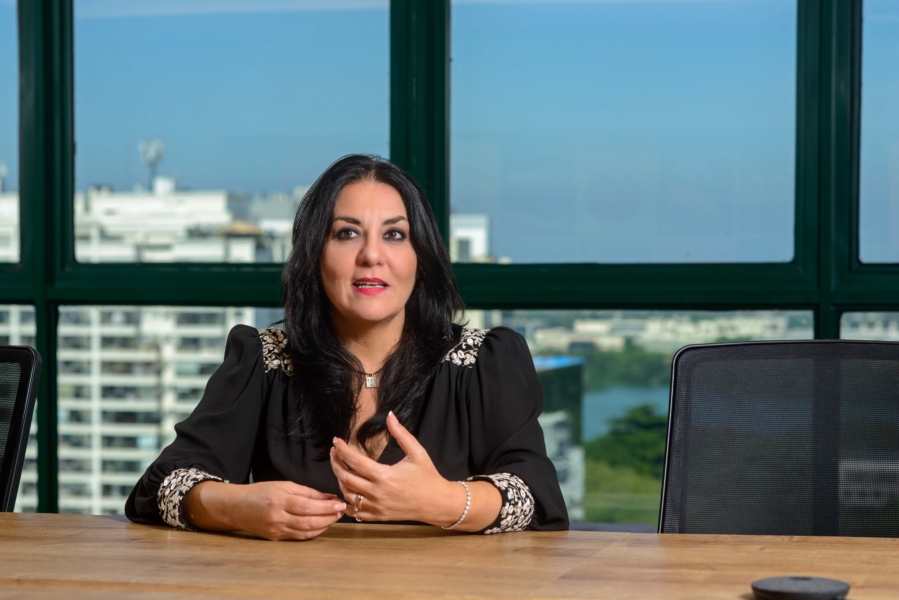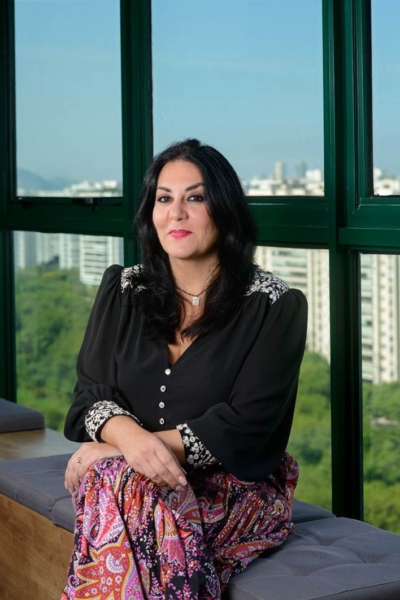PEOPLE AT THE HEART OF THE STRATEGY

O Reputation Feed invited the Italian Maria Antonietta Russo, Vice President of People, Culture and Organization of TIM Brazil, for the closing interview of the series of conversations that bring the vision of large Brazilian companies or those operating in the country in relation to human resources management and the impact on reputation and business strategy.
Maria Antonietta, who began her career at the company in Rome almost 30 years ago, has been leading the area in Brazil since July 2019, where she leads the transformation of the organizational culture and a recognized diversity and inclusion program, which led the company to integrate important portfolios in the financial market.
Read the main excerpts from the interview below.
TIM Brazil
Sector: Telecommunications
Foundation: TIM arrived in Brazil in 1998
Performance: national
Contributors: 10 thousand
Clients: Over 62 million (Q1/25)
Net revenue: R$ 25.4 billion (2024)
ANK Reputation Survey pointed out that the priority of senior leadership in 2025 is people development, talent retention and/or succession in companies. In your opinion, what does this result mean?
People development has always been fundamental. The concept has changed. With the digital age, the relationship between people development, organizational culture and sustainable business development has become stronger. All three are important and contribute to creating a virtuous circle in which people engagement and training are fundamental to competitiveness.in addition to) the basis of a solid path in brand building. People, culture and business must have a single purpose.
Reputation, like this circle, has an impact on the business. How does the company see this relationship with the reputational issue?
Considering this sector, the consumer chooses a product or service not only because of a technological advantage, but also because it reflects individual values. When I say that we are an innovative company, it means that we are also a company with an inclusive culture, with a culture of tolerance for mistakes and that provides a environment where people can express their thoughts. An environment that offers these types of characteristics and values has an impact on increasing the quality perceived by the customer of the value of the product and the brand. I have no doubt that TIM has managed to build a very strong recognition in relation to the diversity and inclusion agenda.
When you talk to me about reputation, the words that come to mind are coherence between what you say and what you do. Consequence management is (also) super important.
And if a value is declared, everything has to respect it. So there needs to be zero tolerance for any behavior that is not aligned with that value. This also means a system of very clear, well-communicated rules, policies and processes where everyone knows what is and what is not allowed and what is valued.
Did this process that links culture, people and business start from the stronger inclusion and diversity agenda?
TIM's ESG agenda has always been present. In the case of TIM Brasil, I tried to accelerate the construction of a more robust system. When you decide to take this path, you already consider that you probably won't be able to see the end. It's an agenda with the ambition that it will continue after you. This is how a cultural evolution path should be interpreted. It's not something you change overnight, you build it. That's why I see a strong correlation between culture and reputation; you build it with consistency, coherence, awareness, resilience.
“There is no reputation without reputational risk. Impossible. Even with policies, processes, initiatives, a person’s behavior is enough to generate reputational risk. But having built a consistent path shows how solid and coherent your agenda is.”

What are the company's main challenges when it comes to reputation related to people management?
And let me also say something about culture. AI is disruptively changing skills and profiles; many jobs will disappear as well as emerge. The hardest part is finding the right one. trade off between maintaining people's engagement and companies making impactful decisions in this regard. This is the biggest challenge: how to sustainably accompany the transformational evolution, which includes skills, work, organizational and operational models, and which impacts the system rewarding and careers. The company's competitiveness and people's engagement need to be maintained while they are prepared to face these transformations. It is at these times that there may be a misalignment between the perception of values, culture, engagement and business.

How does people management face current reputational risks, such as data leaks and the use of social networks?
We have launched many academies, including Data, AI and Agile Academy, and now Cyber Academy. There are several courses on information security, because it is important and can put the company at reputational risk. A course or an academy is not just a topic of upskilling, becomes a cultural topic, because it has reputational consequences. For example, when we launch a program like Respect breeds Respect, We have begun to build an agenda that values inclusive culture, and any failure along the way could cause reputational risk. We are doing the same for super-sensitive items related to information security and working on this responsibility.
In what way?
The path was one-way, the company had the responsibility to develop people. In the digital age, the responsibility of people in this development is more emphasized. The most important thing is not (only) provide quality content, but also make people understand what their individual responsibility is in building this path.
“When we provide educational and communication pathways, we also work on raising awareness at an individual level. What is my contribution as a collaborator? Reputation is created by acting and also by not acting. So, it is related to acting and not conforming to wrong things.”
How does this work show that people themselves are responsible for their development?
We work holistically on any initiative involving people, culture and business. First, we conduct meta-analysis on what we have, what is missing and what we would like to position ourselves in. This has to result in a diagnosis. With the diagnosis in place, we decide on the path forward. The most important thing is to ensure that the action is not just educational or communication-related. I make sure that the policies, processes and tools are up to date; whether the system needs to evolve; and all aspects related to operational functioning and the consequence management system.
Then, Who are the main people responsible for the company's reputation?
Everyone. From the CEO to the apprentice. Everyone has their own responsibility in creating, building the company's reputation, as well as breaking the company's reputation. I address this topic of reputation building at an individual and collective level in a book I participated in (Women Who Transform, Editora Leader).
Why did you choose to embark on the diversity and inclusion journey?
When I was invited to come to Brazil, the CEO at the time asked me to reposition the TIM brand in a more innovative way. Working on organizational evolution in terms of innovation means rethinking the organizational model, structure, process, all management and people development tools and, above all, promoting an inclusive culture. To be perceived as innovative, it has to be seen as an inclusive brand, especially in a country like Brazil, with multiple needs, respecting the culture of each state and each customer.
Among the most inclusive in the world
TIM Brasil achieved 2nd place among the most diverse and inclusive companies in the world by FTSE Russell D&I Index 2024. The index evaluates 15,500 global publicly traded companies, according to 24 metrics distributed across four pillars: Diversity, Inclusion, Career Development and Social Impact. Source: TIM
And what is the evolution of this agenda?
It started as diversity and inclusion and then became the one that has supported the entire people agenda. To work on an agenda of this type, it is necessary to measure, measure and measure. In addition, we cross-reference all indicators with climate, engagement, performance, career. Through these initiatives, for example, the percentage of women in leadership rose from 36.2% in 2023 to 37.4% in 2024, and the goal is to maintain it above 36% by 2027. Ethnic representation is also super important. We have already surpassed the goal of reaching 40% of black people in headcount by 2025; we are at 42%. It is important to measure, constantly review and cross-reference the indicators. This positioning brings us international recognition.
Christianne Schmitt is editor of the Reputation Feed
Christianne.schmitt@ankreputationfeed.com.br
. Click to read or revisit, in the People at the Center of Management series, the interviews with Márcia Costa, VP of People Management at Aegea, and Ricardo Burgos, VP of People and Security at Amil Group and Patricia Pugas, Executive Director of People Management at Magazine Luiza.


